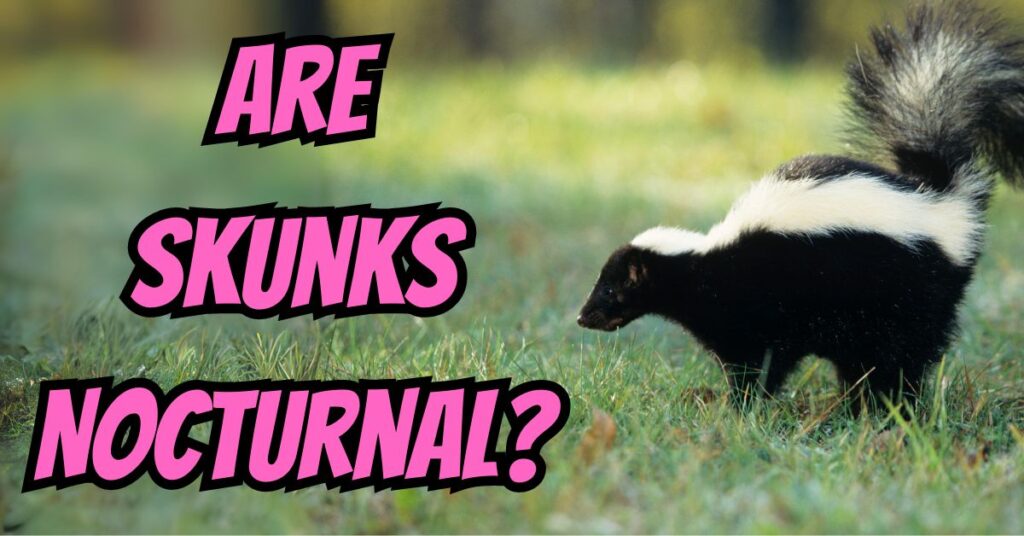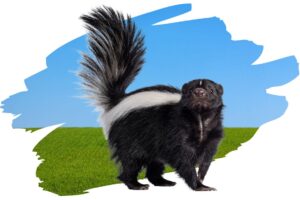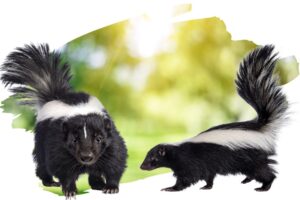
Table of Contents
When the sun dips below the horizon, you can bet the night owls will be hooting. While the early birds are worm catchers, the real party animals come alive after dark.
Bats flutter through inky skies, crickets chirp to the moon, and nocturnal rodents emerge from their hidey holes. But what about the skunk – that ebony and ivory-striped mammal packing a notoriously nasty odor?
Does this funky creature really stay up all night getting its groove on? Or is it less of a party animal than its dramatic coloring would suggest? We’re going to get to the bottom of the riddle, are skunks nocturnal.
Skunks have a reputation for being creatures of the night, prowling once the sun goes down. But some animals defy simple labels like “nocturnal.”
The truth about skunks might surprise you – their habits aren’t always black and white. As it turns out, assumptions about their sleep cycles kind of stink.

We’re going to sniff out the facts about when skunks are sawing logs versus staying up to cha-cha slide. Sometimes you have to look past stereotypes to see an animal’s true stripes.
So plug your noses, because we’re about to spray some knowledge and clear the air regarding the persistent myth of skunks as nighttime prowlers.

Natural Habits and Behaviors
When it comes to understanding if skunks are nocturnal, we have to look at how they naturally operate. What time do skunks punch the clock each day? Are they the type to burn the midnight oil or hit the hay early?
In general, skunks tend to go about their business in the twilight hours. They’ll catch some shuteye in dens during the day, then emerge at dusk to start patrolling for food.
Skunks are omnivores, so their dinner menu includes tasty treats like insects, small mammals, fruits, nuts, and fungi. They forage solo using their excellent sense of smell to sniff out vittles.
But skunks aren’t just about the grind – they need rest too. Come morning, these animals typically clock out as the sun rises.
They return to their dens and log some zzz’s until evening falls again and it’s time to do the whole dance over. However, skunks don’t always operate on such a rigid schedule.
These creatures have a flexible agenda and will adjust their habits as needed. For example, a mama skunk with kits may need to hunt during the day while the little ones nap.
The takeaway is that skunks generally follow a cycle of being active at night and sleeping during the day. But they aren’t wedded to Dracula hours.
Skunks will get their beauty rest and hunt for food whenever necessary. So while they tend to embrace their role as masked bandits of the night, skunks aren’t completely married to the creature of the night reputation.

Skunks’ Sleeping and Activity Patterns
So when exactly are skunks up and at ’em versus snoozing? Let’s break down their beauty rest versus beast mode hours.
Skunks are most active at dawn and dusk – prime time for feeding and frolicking. They follow their noses to root out food in the dim light before bedding down around sunrise. Skunks spend much of the day curled up in their dens sleeping, though some may poke their heads out for a midday snack break. Don’t disturb a slumbering skunk!
Come early evening, skunks wake from their catnaps and prep for another night on the town. Dusk is go time for these masked bandits as they leave their dens to hunt. Under cover of darkness, skunks patrol 50-150 acres while foraging. Their activity peaks during crepuscular hours when the freaks come out at night.
By midnight, the party starts winding down for skunks. They’ll make last call around 3 or 4am before turning in at dawn. So while skunks carouse at night, they aren’t night owls. These rabble-rousers log 7-8 hours of sleep per 24-hour cycle.
The verdict? Skunks are active at night but not nonstop. They party hard at dusk and dawn but rack out during the day. So while skunks embrace their role as hustling creatures of the night, they aren’t solely nocturnal. Their pattern is more catnap than vampire.
Why Understanding Skunks’ Nocturnality Matters
So now that we’ve sniffed out when skunks are living that nightlife, why does it matter whether they are nocturnal or not? What’s the big deal about their sleep habits? Let’s dig into why it pays to understand their true nature.
For one thing, knowing skunks aren’t exclusively nocturnal can help avoid unwanted meetings. Nobody wants to stumble on a skunk during a late night stroll! Since skunks are most active around dawn and dusk, people should be extra cautious at those times. But you still need to keep your eyes peeled for daytime skunks too.
Their sporadic schedule also impacts pest control. Skunks sometimes snag chickens or raid trashcans, much to farmers’ and homeowners’ chagrin! Understanding when skunks are most likely to go on food raids can help implement preventive measures. It’s key to lock up the cluckers and take out the trash before dusk so skunks don’t get any bright ideas.
And let’s not forget skunk odor defense! Getting squirted by a skunk is no fun, so avoid provoking them whenever possible. Be extra vigilant and keep your distance particularly around their prime time. But since skunks don’t solely operate on vampire hours, you need to watch your step day or night.
The moral of the story? Understanding skunks aren’t strictly nocturnal helps people coexist with them safely. So hold your nose, give skunks space, and respect their flexible lifestyle!

Are Skunks Nocturnal Wrap up
The rumor mill suggests skunks only come out to play under cover of darkness. But as we’ve learned, the truth about skunks stinks – their habits aren’t so black and white. These critters certainly embrace the nightlife, prowling dutifully in the twilight hours. But skunks don’t just sleep all day and let loose after dark. They follow flexible schedules tailored to their needs.
So are skunks nocturnal? Not exactly. While primarily active at night, skunks will get busy at dawn or dusk. And they don’t hesitate to tend to business in daylight either. These animals stay up past their bedtime and sleep in when needed. So in summary, skunks are not strictly nocturnal, even if they prefer haunting the night.
The next time you catch a whiff of eau de skunk in the air, think twice before assuming what time it is. Skunks march to the beat of their own drum and make odoriferous appearances day or night. So plug your nose, give them space, and respect their right to an eccentric schedule!
Watch this video for more awesome skunk facts!
The Are Skunks Nocturnal FAQ
What time of day are skunks most active?
Skunks are most active at dawn and dusk.
Are skunks completely nocturnal?
No, skunks are not completely nocturnal.
Where do skunks go during the day?
During the day, skunks stay in dens or burrows.
Do skunks sleep in daytime?
Yes, skunks sleep during the day.
Are skunks blind or deaf?
Skunks are not blind or deaf.
Do skunks bite?
Yes, skunks can bite if threatened.
Are there skunks in Europe?
No, there are no skunks naturally in Europe.
What is the natural enemy of a skunk?
Great horned owls are a skunk’s main predator.
What countries do skunks live in?
Skunks live in the Americas from Canada to South America.
What does a skunk smell like?
Skunks smell like sulfur or burning rubber.
Are skunks afraid of humans?
Skunks are wary of humans but not truly afraid.
What scares skunks?
Loud noises, fast movements, and threats scare skunks.
Do skunks eat rats?
Yes, skunks will eat rats and other small rodents.
What are 3 facts about skunks?
Three facts: have powerful scent glands, are omnivores, and are not true nocturnal animals.
What is the lifespan of a skunk?
Skunks live 2-4 years in the wild.
Do foxes eat skunks?
Yes, foxes are known to eat skunks.
Do skunks warn before spraying?
Skunks usually give warning before spraying by stomping feet and raising tail.
Why do skunks spray every night?
They don’t spray every night. They only spray when threatened.
